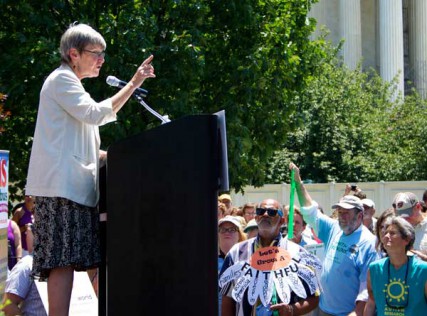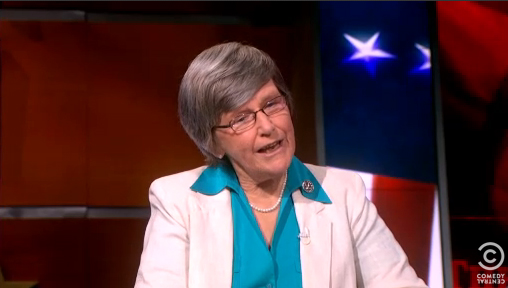Video courtesy the Democratic National Convention (2012)
(RNS) Paul Ryan has been taking a lot of heat over the factual accuracy of claims he made in his prime time address at the Republican convention last week, but Wednesday night at the Democratic confab the GOP vice-presidential candidate – and practicing Catholic – was schooled by a popular nun on the moral shortcomings of his budget proposals.
“Paul Ryan claims this budget reflects the principles of our shared faith,” Sister Simone Campbell, who became a celebrity of sorts this summer when she led the national “Nuns on the Bus” tour for social justice, told cheering Democratic delegates in Charlotte.
“But the United States Conference of Catholic Bishops stated that the Ryan budget failed a basic moral test, because it would harm families living in poverty,” Campbell said.
“We agree with our bishops, and that's why we went on the road: to stand with struggling families and to lift up our Catholic sisters who serve them. Their work to alleviate suffering would be seriously harmed by the Romney-Ryan budget, and that is wrong.”
By framing her critique in the context of her Christian faith, Campbell was directly challenging the Republicans in the kind of religious language that has been a hallmark of the GOP’s campaign to rally believers behind Mitt Romney and Ryan.

Sister Simone Campbell addresses an audience Monday July 2, 2012 to concluded the Nuns on the Bus tour.
But she also sought to identify the sisters and the Democratic agenda with Catholic tradition at a time when Catholic voters – who comprise close to one-quarter of the electorate – are considered key to the November election.
Just as important, Campbell neatly folded her remarks in with statements from the Catholic hierarchy, which has had more than its share of disagreements with President Obama and the Democratic Party over issues like gay marriage and abortion.
Campbell did not address those hot-button issues directly, but she did defend Obama’s health care reform law as a cause she considers “part of my pro-life stance and the right thing to do.”
“In Cincinnati, I met Jini, who had just come from her sister's memorial service,” Campbell said in one of several anecdotes she related from the summer bus tour of nine states. “When Jini's sister Margaret lost her job, she lost her health insurance. She developed cancer and had no access to diagnosis or treatment. She died unnecessarily. That is tragic. And it is wrong.”
Like many other speakers so far, Campbell underscored the plight of poor and working class Americans in the recession, and pointed to Democratic policies as both the most effective answer, and the most moral one.
“During our journey, I rediscovered a few truths,” Campbell said. “First, Mitt Romney and Paul Ryan are correct when they say that each individual should be responsible. But their budget goes astray in not acknowledging that we are responsible not only for ourselves and our immediate families. Rather, our faith strongly affirms that we are all responsible for one another.”
“I am my sister's keeper. I am my brother's keeper,” she said in one of several lines that drew rousing applause.
Here is the text of Campbell's remarks:
Good evening, I'm Sister Simone Campbell, and I'm one of the “nuns on the bus.” So, yes, we have nuns on the bus. And a nun on the podium!
Let me explain why I'm here. In June, I joined other Catholic sisters on a 2,700-mile bus journey through nine states to tell Americans about the budget Congressman Paul Ryan wrote and Governor Romney endorsed.
Paul Ryan claims his budget reflects the principles of our shared Catholic faith. But the United States Conference of Catholic Bishops stated that the Ryan budget failed a basic moral test, because it would harm families living in poverty.
We agree with our bishops, and that's why we went on the road: to stand with struggling families and to lift up our Catholic sisters who serve them. Their work to alleviate suffering would be seriously harmed by the Romney-Ryan budget, and that is wrong.
During our journey, I rediscovered a few truths. First, Mitt Romney and Paul Ryan are correct when they say that each individual should be responsible. But their budget goes astray in not acknowledging that we are responsible not only for ourselves and our immediate families. Rather, our faith strongly affirms that we are all responsible for one another.
I am my sister's keeper. I am my brother's keeper. While we were in Toledo, I met 10-year-old twins Matt and Mark, who had gotten into trouble at school for fighting. Sister Virginia and the staff at the Padua Center took them in when they were suspended and discovered on a home visit that these 10-year-olds were trying to care for their bedridden mother who has MS and diabetes.
They were her only caregivers. The sisters got her medical help and are giving the boys some stability. Now the boys are free to claim much of the childhood they were losing. Clearly, we all share responsibility for the Matts and Marks in our nation.
In Milwaukee, I met Billy and his wife and two boys at St. Benedict's dining room. Billy's work hours were cut back in the recession. Billy is taking responsibility for himself and his family, but right now without food stamps, he and his wife could not put food on their family table.
We all share responsibility for creating an economy where parents with jobs earn enough to take care of their families. In order to cut taxes for the very wealthy, the Romney-Ryan budget would make it even tougher for hard-working Americans like Billy to feed their families. Paul Ryan says this budget is in keeping with the moral values of our shared faith. I disagree.
In Cincinnati, I met Jini, who had just come from her sister's memorial service. When Jini's sister Margaret lost her job, she lost her health insurance. She developed cancer and had no access to diagnosis or treatment. She died unnecessarily. And that is tragic. And it is wrong.
The Affordable Care Act will cover people like Margaret. We all share responsibility to ensure that this vital health care reform law is properly implemented and that all governors, all governors, expand Medicaid coverage so no more Margarets die from lack of care. This is part of my pro-life stance and the right thing to do.
I have so many other stories but let me tell you one more. In Hershey, Pennsylvania, a woman in her late thirties approached us. She asked for the names of some people she could talk to, because she felt alone and isolated. Her neighbors have been polarized by politics masquerading as values. She cares about the well-being of the people in her community.
She wishes they, and the rest of the nation, would listen to one another with kindness and compassion. Listen to one another rather than yell at each other. I told her then, and I tell her now, that she is not alone.
Looking out at you tonight, I feel your presence combined with that of the thousands of caring people we met on our journey. Together, we understand that an immoral budget that hurts already struggling families does not reflect our nation's values. We are better than that.
So I urge you, I urge you, join us on the bus. Join us as together we stand with Matt and Mark, Billy and his family, the woman in Hershey and the Margarets of our nation.
This is what we nuns on the bus are all about: We care for the 100 percent, and that will secure the blessings of liberty to ourselves and our nation. So join us as we nuns and all of us drive for faith, family and fairness.





